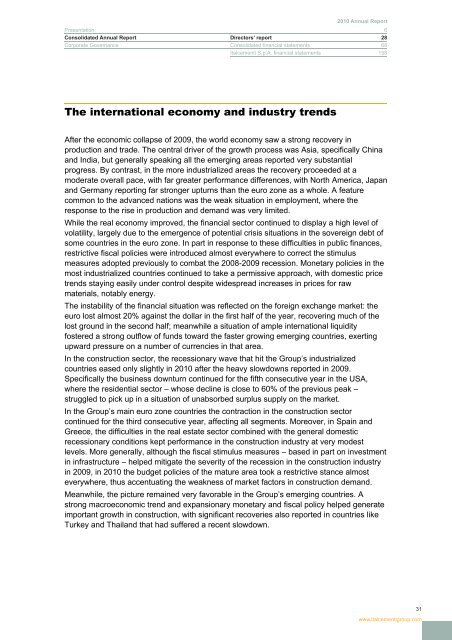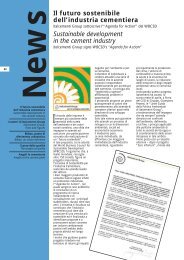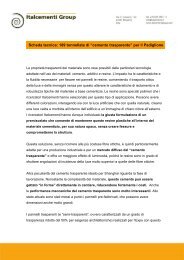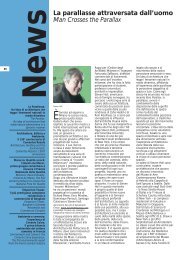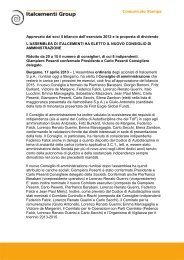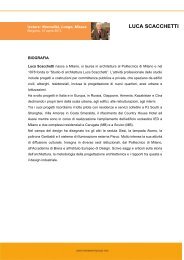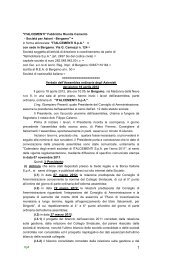Report 2010 - Italcementi Group
Report 2010 - Italcementi Group
Report 2010 - Italcementi Group
You also want an ePaper? Increase the reach of your titles
YUMPU automatically turns print PDFs into web optimized ePapers that Google loves.
<strong>2010</strong> Annual <strong>Report</strong><br />
Presentation 6<br />
Consolidated Annual <strong>Report</strong> Directors’ report 28<br />
Corporate Governance Consolidated financial statements 68<br />
<strong>Italcementi</strong> S.p.A. financial statements 158<br />
The international economy and industry trends<br />
After the economic collapse of 2009, the world economy saw a strong recovery in<br />
production and trade. The central driver of the growth process was Asia, specifically China<br />
and India, but generally speaking all the emerging areas reported very substantial<br />
progress. By contrast, in the more industrialized areas the recovery proceeded at a<br />
moderate overall pace, with far greater performance differences, with North America, Japan<br />
and Germany reporting far stronger upturns than the euro zone as a whole. A feature<br />
common to the advanced nations was the weak situation in employment, where the<br />
response to the rise in production and demand was very limited.<br />
While the real economy improved, the financial sector continued to display a high level of<br />
volatility, largely due to the emergence of potential crisis situations in the sovereign debt of<br />
some countries in the euro zone. In part in response to these difficulties in public finances,<br />
restrictive fiscal policies were introduced almost everywhere to correct the stimulus<br />
measures adopted previously to combat the 2008-2009 recession. Monetary policies in the<br />
most industrialized countries continued to take a permissive approach, with domestic price<br />
trends staying easily under control despite widespread increases in prices for raw<br />
materials, notably energy.<br />
The instability of the financial situation was reflected on the foreign exchange market: the<br />
euro lost almost 20% against the dollar in the first half of the year, recovering much of the<br />
lost ground in the second half; meanwhile a situation of ample international liquidity<br />
fostered a strong outflow of funds toward the faster growing emerging countries, exerting<br />
upward pressure on a number of currencies in that area.<br />
In the construction sector, the recessionary wave that hit the <strong>Group</strong>’s industrialized<br />
countries eased only slightly in <strong>2010</strong> after the heavy slowdowns reported in 2009.<br />
Specifically the business downturn continued for the fifth consecutive year in the USA,<br />
where the residential sector – whose decline is close to 60% of the previous peak –<br />
struggled to pick up in a situation of unabsorbed surplus supply on the market.<br />
In the <strong>Group</strong>’s main euro zone countries the contraction in the construction sector<br />
continued for the third consecutive year, affecting all segments. Moreover, in Spain and<br />
Greece, the difficulties in the real estate sector combined with the general domestic<br />
recessionary conditions kept performance in the construction industry at very modest<br />
levels. More generally, although the fiscal stimulus measures – based in part on investment<br />
in infrastructure – helped mitigate the severity of the recession in the construction industry<br />
in 2009, in <strong>2010</strong> the budget policies of the mature area took a restrictive stance almost<br />
everywhere, thus accentuating the weakness of market factors in construction demand.<br />
Meanwhile, the picture remained very favorable in the <strong>Group</strong>’s emerging countries. A<br />
strong macroeconomic trend and expansionary monetary and fiscal policy helped generate<br />
important growth in construction, with significant recoveries also reported in countries like<br />
Turkey and Thailand that had suffered a recent slowdown.<br />
31<br />
www.italcementigroup.com


